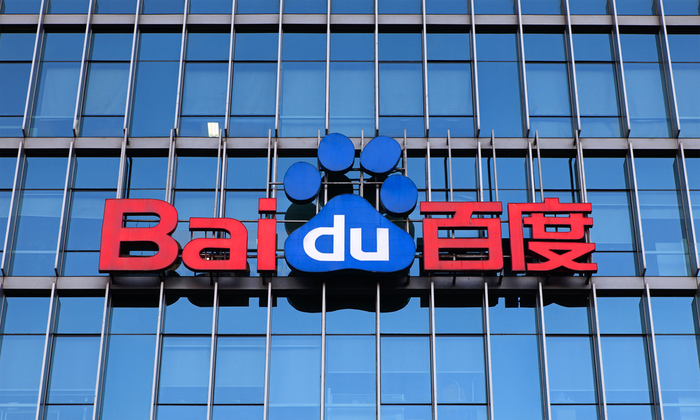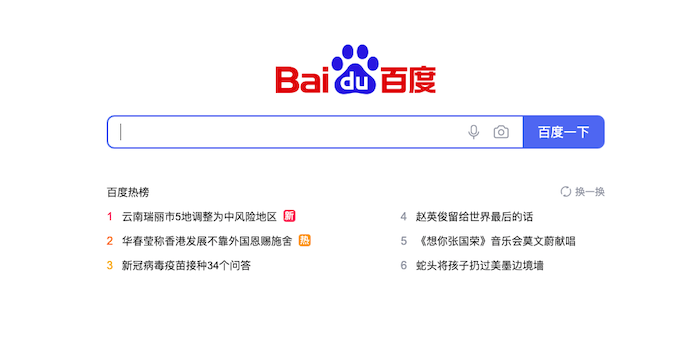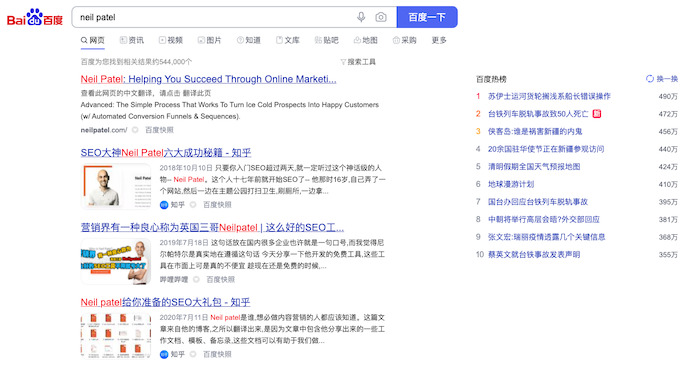
While Google, Bing, and Yahoo control the West’s market share of search engine traffic, alternative search engine Baidu is the king of search in China.
If you want to make your content known on Baidu, you need a strong SEO strategy to guide you. What works on Google may not work on Baidu, however, so we’ve created this guide to teach you how to earn a position in Baidu’s search engine results for users that are in the U.S.
What Is Baidu?
Baidu is an internet and AI company offering a range of services, including search, cloud computing, music, maps, translation, video, and even self-driving cars. One Baidu service, Baidu Baike, is even thought of as a Wikipedia clone. The online encyclopedia boats over 16 million articles and 6.9 million editors.
Yet, the biggest asset Baidu offers is its search engine. Originally launched in 2000, Baidu was an early player in Chinese search. In many ways, their early platform seemed to copy Google in approach and design, leading many to think of them as a Chinese Google copycat rather than a true competitor.
Fast-forward to the current day, and Baidu owns 68.5 percent of the search engine market share in China and boasts around 1.54 billion searches per day. They bring in an average of $16.4 billion per year and record around 202 million daily active users.
A large part of Baidu’s success can be attributed to its ability to index Chinese web pages better and more effectively than any other search engine. The user-face is only available in Simplified Chinese, and the search results give priority to Chinese language sites. Few non-Chinese language sites are ever included in the Baidu index or search engine results.
Baidu Vs. Google
Baidu has always been critiqued as being a Google copycat, and the similarities are certainly present.
When Google decided to stop showing ads on the Search Engine Results Page’s right-hand side, Baidu followed suit only a few months later.
Both search engines offer a similar user-face: a simple logo, a search bar, and added features below.


In terms of product offerings, maps, music and video platforms, translation services, and travel sites are on both platforms.
Both Google and Baidu offer similar search features, though Google’s algorithm and indexing capabilities seem to be a bit more robust.
Baidu is also known for its liberal use of rich snippets early on, while Google has only increased its use of rich snippets in recent years. Many SEO experts have suggested Google copied Baidu in this way.
The main differences between Baidu and Google rest in their individual SERPs. Here are a few clear differentiators between the two platforms:
- While Google search results are available in 149 different languages, Baidu is only offered in Simplified Chinese.
- Baidu links open in a new window, keeping the Baidu home page available at all times.
- Most Baidu search results have thumbnail images included.
- Rich snippets on Baidu are often dynamic and interactive, which sets them apart from Google. They are often tall, full of links, and even contain interactive JavaScript apps on the SERP.
- Baidu’s rich-snippets can occupy up to 70 percent of a page.
8 Ways to Optimize for Baidu
If you run a business with Chinese clientele or want to promote your products to a Chinese audience, optimizing your content for Baidu can help you open those doors.
Baidu has explained the way their spiders crawl and index websites. Many websites are not included on Baidu by default, due to their algorithm.
Additionally, due to strict internet censorship in China, aka the Great Firewall of China, many of the below tactics are requirements rather than suggestions. The ICPL licensing (discussed below) is one such example.
Here are some sites Baidu automatically filters out:
- any sites with duplicate content are filtered; if the content is available in more than one place on the internet, Baidu will not include it twice
- Baidu won’t rank short content pages
- JavaScript and AJAX content will not be ranked, though users will be able to see it
- pages that are slow to load may be treated as empty or short pages
- webpages whose main body is not prominent will not be crawled
Below, we’ll outline ways to ensure your content is crawled and ranked by Baidu.
1. Use a .CN Domain
On the Baidu SERPs, .com sites are not favored, and having a .cn domain will help increase your chances of getting listed. That said, it may be difficult to acquire a .cn domain outside of China.
To attain a .cn domain, you need to either be a Chinese citizen or own a Chinese business. Additionally, all websites based in China must have a Bei’An license, and commercial websites must have an ICP license.
Due to heavy Chinese internet restrictions, attaining these licenses can be time-consuming and complicated. While this may seem off-putting, if you want your content to show up in the Baidu SERPs, it’s worth investing time to get a .cn domain to secure top rankings.
It’s also important to note the Great Firewall of China can add latency to sites loading from outside of China. For this reason, having a .cn domain is preferred not only for Baidu but for Chinese browsing experiences in general.
2. Acquire Licensing (ICPL)
To legally host a website in China, you need to have an internet content publishing license (ICPL).
ICPL’s can be broken down into two license types:
- Individual licenses: can only be issued by providing Chinese state-issued personal ID
- Business licenses: require Chinese business registration
While Baidu has never explicitly said ICPLs are required, to have your site verified by Baidu Trust, an ICPL number is required.
ICPL licensing can be difficult for foreign companies to acquire. Your best bet is usually to set up as a Chinese company before tackling Chinese hosting.
3. Avoid Using JavaScript
The Baidu search engine spider does not crawl JavaScript sites due to complications in links, navigational elements, and language changes.
This means that although your site will be displayed, it won’t be crawled or ranked. Be sure to provide an HTML alternative the engine can read.
As a side note, flash players are also unusable on Baidu.
4. Ensure Your Content Is High Quality
Baidu has always prioritized user experiences over ads. In 2013, they updated their algorithm to include a “pomegranate” update, which penalized sites that displayed user experience pitfalls with spammy ads and low-quality content. Sites with high-quality content are boosted over those with low-quality content.
Content that is penalized by Baidu’s pomegranate update:
- sites with a large quantity of low-quality pop-up windows
- advertisements mimicking page content
- pages with malicious ads or content
To avoid getting penalized by the algorithm, avoid using pop-up advertisements on your website, and be sure to use clear, high-quality content across your site.
5. Prioritize Link Building
Link building is an important factor if you want to rank on Baidu. In the past, Baidu seemed to favor link quantity over quality, but with the pomegranate update, high-quality backlinks have taken priority.
When creating a link-building plan for Baidu, focus on high-authority Chinese sites over those listed in other countries.
Also, be sure to include internal and external anchor text in your copy. For internal links, ensure each page on your site links back to your home page, and the homepage only links to the main category pages. Any sub-category pages should only be linked within your main category pages.
Unlike some other search engines, Baidu also counts non-hyperlinked URLs, so including these within your text can contribute to your ranking.
6. Perfect Your Meta Description and Metadata
Unlike Google, Baidu still includes meta descriptions and meta keywords in their ranking factors. This means you need to have unique and descriptive meta descriptions, metadata, and title tags that are keyword optimized in Simplified Chinese.
A good meta description provides a clear and succinct description of what a user can find on the page. It’s important to write tailored descriptions for each page of your website and use three to five meta keywords on each page to improve your Baidu ranking chances.
Baidu allows up to 80 characters in a title tag and 200 characters in a meta description. The character count for meta keywords is 100.
Alt tags and heading tags also play a part in your Baidu rankings, so be sure to optimize these in Chinese as well.

7. Use Pinyin in the URL and Simplified Chinese in the Body
Pinyin is a romanized version of Chinese that uses English characters to spell Chinese characters based on Mandarin pronunciation.
Baidu prefers URLs that are written in Pinyin, while the rest of the site uses Simplified Chinese.
When using Pinyin, be careful of your word choice. Baidu censors anti-government speech, adult content, gambling, and anything they consider to be culturally insensitive. While you may think it is easy to avoid this language, it can be more difficult than you think. Some words seem innocent but aren’t. For instance, “toad” and “rubber duck” are banned due to their political connotations.
Be sure to conduct Chinese-specific market research before listing on Baidu to ensure you won’t violate censorship laws.
8. Optimize for Mobile
Baidu has 1.1 billion monthly active mobile users, which means most Baidu users will see your website on a mobile screen.
While Google’s mobile search platform uses the same URL as its desktop version, Baidu’s mobile search is run through m.baidu.com. Baidu will transcode sites that aren’t automatically mobile-friendly to make them load faster. This means your content will be automatically hosted on Baidu’s servers. No approval is necessary by the owner.
The downside of this automatic transcoding is it can affect the UX/UI of your website dramatically. This can lead to negative on-site experiences for your audience members and many users exiting your site too early.
To combat this, ensure your website is optimized for mobile from the start. This will help you deliver high-quality website experiences and keep your audience on your pages longer.
Conclusion
While Baidu may treat search engine rankings differently than Google or Bing, it’s worth investing your time in it if you want to attract Chinese business.
That said, general search engine optimization techniques still apply here, so be sure to follow SEO best practices when creating Baidu content.
This, alongside the specialized requirements of the Baidu platform, could help you rank higher more often.
If the thought of SEO even in English sounds daunting, let our agency know and we can help.
How has Baidu search affected your business?
About us and this blog
We are a digital marketing company with a focus on helping our customers achieve great results across several key areas.
Request a free quote
We offer professional SEO services that help websites increase their organic search score drastically in order to compete for the highest rankings even when it comes to highly competitive keywords.
Subscribe to our newsletter!
More from our blog
See all postsRecent Posts
- Web Hosting September 26, 2023
- Affiliate Management September 26, 2023
- Online Presence Analysis September 26, 2023

